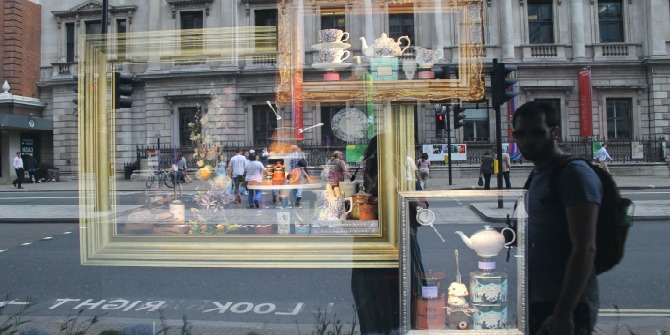 Window dressing, by Connie Ma, under a CC-BY-SA-2.0 licence
Window dressing, by Connie Ma, under a CC-BY-SA-2.0 licence
Entrepreneurs dress up their windows. Greengrocers display their greenest apples in crates in front of their shops. Financial institutions improve the appearance of their fund’s performance near the end of the quarter. And oil companies’ launch campaigns to let the world know that they are investing in environmentally friendly technologies.
At first sight, window dressing seems to be a beneficial corporate strategy. A nice window attracts customers, improves sales and enhances reputations (Alniacik, Alniacik, & Genc, 2011; Pirsch, Gupta, & Grau, 2007). However, if the goods in the window do not reflect the goods in the store, window dressing can have a backlash effect. That is, customers probably do not return to your store when they are lured inside by green apples where they find out that only brown apples are on sale. As a result, it is unlikely that they will promote your store among their friends. On the contrary, it is more likely that they will warn their friends not to go there. Because this customer behaviour is the exact opposite from what is intended, window dressing might not be considered as a beneficial strategy unquestioningly.
Window dressing can lead to resistance such as protest and boycott when customers feel manipulated or deceived. The psychological process that can describe this is reactance. Psychological reactance (Brehm & Brehm, 1981) is a form of emotional arousal — a combination of anger and negative cognitions — that is activated after people experience a threat to a behavioural freedom, for instance by manipulation or deception. The arousal motivates people to protect and restore the threatened freedom. They can do this by doing exactly the opposite of what is expected from them (de Vries, 2017).
You might be under the impression that this backlash effect of window dressing only occurs when entrepreneurs lie outright and are clearly deceiving their customers. However, also when you bend or overstate your good side and obscure your not-so-good side you run the risk that customers will turn their backs on you (Vos, 2009). This is illustrated by the award British Petroleum received from Greenpeace in 2008 for the “worst greenwash”. BP got awarded for announcing it was going green while still allocating more than 90 per cent of its total investment fund to the development and extraction of “dirty” fossil fuels (BP wins ‘Emerald Paintbrush’ award, 2008). Corporate greenwashing — window dressing in the environmental domain — can lead to a range of detrimental consequences including protest, boycott, and financial loss for the company (Polonsky & Rosenberger, 2001).
Coca Cola has also been publicly accused of window dressing. In 2013, the soft-drink maker launched a large advertisement campaign emphasising the company’s corporate responsibility for public health. At that time, the company was perceived as one of the main contributors (together with fast-food chains such as McDonalds and Burger King) to America’s obesity epidemic. The campaign highlighted the company’s low- and zero-calorie products and their corporate support of physical activity (programs). However, doubts were raised about the sincerity of Coca Cola’s interest in combating obesity. It was suggested that the company’s actual goal was to sell more Coca Cola products and prevent the implementation of soda taxes. Support of these allegations came from the fact that Coca Cola, and other soft-drink makers, spent a lot of money on lobbying against these taxes (Stanford, 2013).
Customers don’t like it when organisations talk the talk but don’t walk the walk. Why are you still making a profit with products that are harmful to people and the planet if you are as green and lean as you portray yourself? In contrast, customers appreciate it when you tell it as it is. They find it credible when you admit publicly that you invest in an innovative low-carbon technology because you can make a huge profit by trading emission rights or by exporting your expert knowledge (de Vries, Terwel, Ellemers, & Daamen, 2015). In a similar vein, you might better communicate that your primary motive for selling low-calorie drinks or kale-salads is to reap the financial benefits of the health hype than to emphasise your interest in public health.
In sum, if your motives are economic, admit it. If you advertise that your good deeds derive only out of social responsibility, customers probably don’t buy it. That is, customers expect companies to be firm-serving instead of public-serving and find it manipulative if you keep up appearances (de Vries, Terwel, Ellemers, & Daamen, 2015).
Having said that, in light of the fact that customers expect companies to be firm-serving instead of public-serving, it could be stated that a little bit of bragging is allowed. Customers understand that you put your nicest apples on display instead of the uglier ones (de Vries, Terwel , & Ellemers, 2016). However, boasting is less accepted from organisations with a more public-serving mission. These organisations are expected to be completely balanced and unbiased in their activities (de Vries, Terwel , & Ellemers, 2016). Furthermore, there is a fine line between bragging and deceiving. Be careful not to cross this line because people will notice it and act negatively on it (Campbell, 1995).
So, if you want to attract customers, increase their loyalty and your net promoter score, put your greenest apples in the window, but make sure your apples in the back are also green.
♣♣♣
Notes:
- The post gives the views of its authors, not the position of LSE Business Review, the London School of Economics or the University of Minnesota.
- Before commenting, please read our Comment Policy
 Gerdien de Vries is a social scientist with a strong interest in unwanted (and unforeseen) effects of established organizational strategies. Gerdien is assistant professor Organisation and Public Relation at the faculty of Technology, Policy, and Management at Delft University of Technology (the Netherlands). Follow Gerdien on Twitter: @GerdienDeVries
Gerdien de Vries is a social scientist with a strong interest in unwanted (and unforeseen) effects of established organizational strategies. Gerdien is assistant professor Organisation and Public Relation at the faculty of Technology, Policy, and Management at Delft University of Technology (the Netherlands). Follow Gerdien on Twitter: @GerdienDeVries





